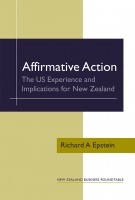
Affirmative Action: The US Experience and Implications for New Zealand
This lecture, Affirmative Action: The US Experience and Implications for New Zealand, was delivered on 3 August 2004 at the offices of Russell McVeagh, Wellington. Read more


This lecture, Affirmative Action: The US Experience and Implications for New Zealand, was delivered on 3 August 2004 at the offices of Russell McVeagh, Wellington. Read more

The submission comments on the proposal that the Council should contribute up to $3.95 million per annum for seven years towards the costs of holding the V8 Supercar Championship series (V8 race) in Wellington city from April 2006. Read more
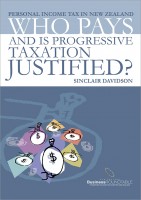
There is a perception in New Zealand that the so-called ‘rich’ do not pay their fair share of tax. Yet the evidence examined by Sinclair Davidson shows this to be untrue. Read more
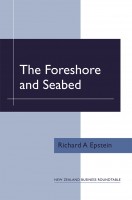
On my last visit to New Zealand in 1999 I spoke as an outsider to a sceptical audience on how best to interpret the Treaty of Waitangi.1 I said that one of the great challenges facing a country formed by successive waves of immigrants is to put together disparate norms from rival cultures, each of which has its own distinctive legal understandings as to how the world does or should work. On that occasion I said that I would like to start from a neutral corner, and then proceeded to address several Roman law analogues to the question of prescriptive rights, largely on the basis that the great Roman authors were not influenced by the future events that unfolded in New Zealand. Read more
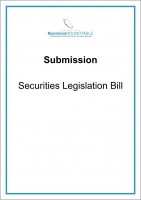
The Bill's explanatory note describes it as an omnibus bill. It will amend the Securities Act 1978, the Securities Markets Act 1988, the Takeovers Act 1993, and the Takeovers Code, with related amendments to other statutes. Read more
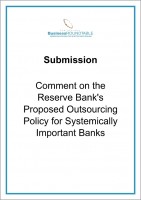
We have several concerns about the propositions contained in paragraphs 20 and 21. We raise them in the context of section 68 of the Act. Read more
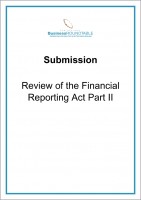
We are grateful for the opportunity to comment on the Ministry's discussion document, Review of the Financial Reporting Act Part II. Read more
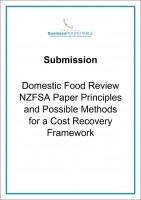
The New Zealand Food Safety Authority (NZFSA) has released five papers that are part of a review of the government’s role in the domestic food sector. The fifth paper, Principles and Possible Methods for a Cost Recovery Framework (the Cost Recovery Paper), states that its purpose is to “propose principles and possible methods for a cost recovery framework for domestic food safety that will determine the funding of functions undertaken by the regulator or on its behalf and who will fund those functions” (p 5). Read more
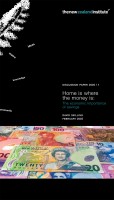
Home is where the money is is the third paper in a series that forms part of the New Zealand Institute’s initial research program on Creating an Ownership Society. This paper follows on from our first two papers, The wealth of a nation, and It’s not just about money. Read more
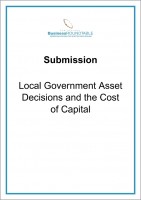
This paper was prepared by Capital Economics Ltd for the Local Government Forum. Read more
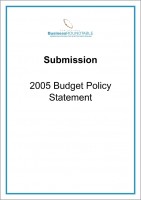
In this submission, section 2 reviews the BPS's objectives. Section 3 discusses whether the fiscal strategy in the BPS is consistent with those objectives and touches on problems of regulation. Read more
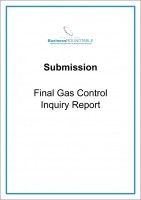
The minister of energy has invited interested parties to comment on new matters raised in the Report, and other relevant matters that have not been the subject of earlier submissions or are not reflected in the Report. In particular, the minister has sought comments on the Report's recommendation that a targeted control regime comparable to that applied to electricity lines businesses under Part 4A of the Commerce Act 1986 should be applied to gas pipeline businesses. Read more
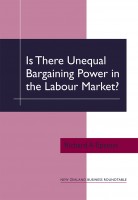
This lecture, Is There Unequal Bargaining Power in the Labour Market?, was delivered in Wellington on 2 August 2004 at the offices of Chapman Tripp Sheffield Young, Wellington. Read more
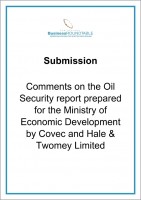
We are writing in response to the invitation to submit comments on the Oil Security report that was prepared by Covec and Hale and Twomey (‘the Report’) and released on 14 December 2004. We agree that the government faces an international relationship problem. Read more
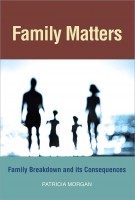
Like many countries, New Zealand has experienced a significant increase in family breakdown since the 1960s. Patricia Morgan finds that the family in New Zealand is now in a worse state than almost anywhere else. Read more